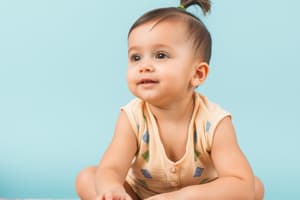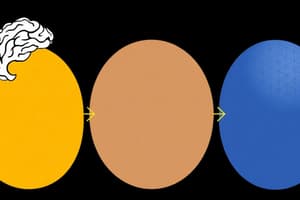Podcast
Questions and Answers
During the Sensorimotor Stage, what skill does the child begin to develop towards the end of this stage?
During the Sensorimotor Stage, what skill does the child begin to develop towards the end of this stage?
- Egocentric thinking
- Problem-solving skills (correct)
- Symbolic thought
- Object permanence
What is the primary goal of the Sensorimotor Stage?
What is the primary goal of the Sensorimotor Stage?
- Developing symbolic thought
- Developing memory and imagination
- Learning to imitate
- Understanding object permanence (correct)
What is the age range for the Sensorimotor Stage?
What is the age range for the Sensorimotor Stage?
- 18-24 months
- 7-12 years
- 2-7 years
- 0-2 years (correct)
What is the term for the mental representations used by a child in the Sensorimotor Stage?
What is the term for the mental representations used by a child in the Sensorimotor Stage?
What is an example of learning cause and effect during the Sensorimotor Stage?
What is an example of learning cause and effect during the Sensorimotor Stage?
What does a child understand about their parent when they leave the home during the Sensorimotor Stage?
What does a child understand about their parent when they leave the home during the Sensorimotor Stage?
During which stage does the infant become aware of the external environment?
During which stage does the infant become aware of the external environment?
What is the primary characteristic of movements during the first month of life?
What is the primary characteristic of movements during the first month of life?
During which stage do infants differentiate between goals and goal-directed activities?
During which stage do infants differentiate between goals and goal-directed activities?
What is the age range during which infants use mental imagery to understand their environment?
What is the age range during which infants use mental imagery to understand their environment?
During which stage do infants initiate acts to change their environment?
During which stage do infants initiate acts to change their environment?
What is the main characteristic of the 'invention of new means through mental combinations' stage?
What is the main characteristic of the 'invention of new means through mental combinations' stage?
What is the primary focus of the second stage of Erikson's theory of psychosocial development?
What is the primary focus of the second stage of Erikson's theory of psychosocial development?
What is the outcome for children who successfully complete the third stage of psychosocial development?
What is the outcome for children who successfully complete the third stage of psychosocial development?
During which stage of psychosocial development do children typically develop a sense of pride in their accomplishments?
During which stage of psychosocial development do children typically develop a sense of pride in their accomplishments?
What is the consequence of failing to acquire the necessary skills during the third stage of psychosocial development?
What is the consequence of failing to acquire the necessary skills during the third stage of psychosocial development?
What is the typical age range for the fourth stage of psychosocial development?
What is the typical age range for the fourth stage of psychosocial development?
During which stage of psychosocial development do children begin to assert their power and control over the world?
During which stage of psychosocial development do children begin to assert their power and control over the world?
Study Notes
Sensorimotor Stage
- The Sensorimotor Stage is the first stage of Piaget's theory of cognitive development.
- The primary goal of this stage is for the infant to develop an understanding of the world through their senses and motor skills.
- The age range for this stage is birth to 2 years.
- The child begins to develop the ability to form mental representations towards the end of this stage.
- Mental representations are mental pictures or symbols that are used to represent objects, events, or experiences.
- An example of learning cause and effect during the Sensorimotor Stage is when a child learns that shaking a rattle will make a noise.
- During this stage, children understand that their parents continue to exist even when they are out of sight.
- Infants become aware of the external environment during the Sensorimotor Stage.
- The primary characteristic of movements during the first month of life is reflexive.
- Infants differentiate between goals and goal-directed activities during the Sensorimotor Stage.
- Infants use mental imagery to understand their environment between 18-24 months of age.
- Infants begin to initiate acts to change their environment during the Sensorimotor Stage.
- The 'invention of new means through mental combinations' stage, the final stage of the Sensorimotor Stage, is characterized by the ability to solve problems mentally.
Erikson's Stages of Psychosocial Development
- The second stage of Erikson's psychosocial development focuses on autonomy vs. shame and doubt.
- Successful completion of the third stage, initiative vs. guilt, leads to children developing a sense of purpose and direction.
- A sense of pride in their accomplishments begins to develop during the third stage, initiative vs. guilt.
- Failing to acquire the necessary skills during the third stage can lead to children developing feelings of guilt and inadequacy.
- The typical age range for the fourth stage of psychosocial development is 5-12 years.
- Children begin to assert their power and control over the world during the fourth stage, industry vs. inferiority.
Studying That Suits You
Use AI to generate personalized quizzes and flashcards to suit your learning preferences.
Description
Test your knowledge about the Sensorimotor stage of development, specifically focusing on the different sub-stages from birth to 2 years old. Explore how sensory organs and muscles progress, including the use of reflexes, circular reactions, and coordination of schemata in new situations.




